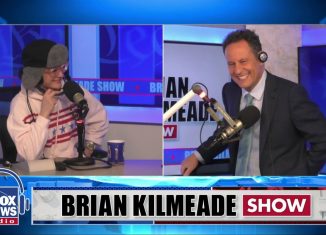Speaker of the House Paul Ryan: We Have To Deliver Tax Reform & Are In Middle Of Doing So
Speaker of the House Paul Ryan (R-WI) joined Brian Kilmeade to discuss the House’s version of tax reform and the impact it will have on Americans. Plus, the Speaker weighed in on what impact Ed Gillespie losing the Virginia governor’s race will have on the Republicans in 2018.
Listen here for the full interview
BRIAN KILMEADE, FOX NEWS RADIO HOST: Welcome back, everyone. Brian Kilmeade here. Thanks so much for listening to the Brian Kilmeade show. In a little while, we’re going to have Bill Hammer on. Yes, that same Bill Hammer. But first things first, there’s only very few people in this world I break format for and give up the big three, and one of them is on the line. He is Speaker Paul Ryan. Mr. Speaker, welcome.
SEN. PAUL RYAN, R-WIS., SPEAKER OF THE HOUSE: Hey, thanks for breaking format. How are you doing, man?
KILMEADE: Anything for you. Now, what time were you up working out today?
RYAN: Six.
KILMEADE: Six o’clock.
RYAN: Yes.
KILMEADE: Knowing that you had a lot to do, is it harder to work out knowing that you had a lot to do?
RYAN: No, it makes it easier actually. It just helps me get on my day. My mind’s a little distracted, but working out’s the best way to just process stress to me.
KILMEADE: Process stress. That’s what I want to bring up to you. A lot of people on either side of the aisle, the republicans are saying last night was no big deal when the marquee matchup was at Gillespie against Northam, and that Gillespie lost by nine. And democrats are saying this is “the beginning of our turnaround.” What do you take from Ed Gillespie’s significant loss yesterday?
RYAN: Well, obviously democrats are going to do that, and we would be saying the same kind of thing. That’s the way the spin works on these things. The way I see it, honestly, is we’ve got to get our job done, and we’ve got to – that’s why I think tax reform is just so important. Not just politically, but just for the country.
And I think what people want to know and see is that this Donald Trump presidency and this republican Congress makes a positive difference in my life. And granted in the House we feel pretty good because we’ve actually been passing this agenda left and right. We’ve passed 394 bills out of the House alone, more in this presidency than in Obama, Clinton, and Bush’s at the same time. It’s just that about 308 of those bills still haven’t gotten into the law. They’re still kind of over in the Senate, so we’re a little gummed up and frustrated there, but that’s why tax reform is so important —
KILMEADE: Right.
RYAN: — because tax reform is one of those things. Those 308 bills I mentioned, those all can be filibustered.
KILMEADE: You talk —
RYAN: Tax reform —
KILMEADE: Right. Well —
RYAN: — cannot be filibustered.
KILMEADE: — Mr. Speaker, you know – you just said that’s the way politics is. People spin their way out of it. Do you have to make (ph) as republicans — either you’re going to side with President Bush and his policies – 43 or more, free trade, and maybe some type of immigration compromise – or do you have to go with Donald Trump? Is it going to be a choice for republicans – Bush or Trump?
RYAN: We already made that choice. We’re with Trump. We already made that choice. That’s a choice we made at the beginning of the year. That’s a choice we made during the campaign which is we merged our agendas. We ran on a joint agenda with Donald Trump. We got together with Donald Trump when he was President Elect Trump and walked through what is it we want to accomplish in the next two years. We all agreed on that agenda. We’re processing that agenda.
Again, in the House, we passed, repeal, and replaced Obamacare. We funded the wall already in the House. We passed rebuilding the military. Once we’re on the second installment there, we pass out veterans over all those. We pass, repeal, and replace of Dodd-Frank.
Now, not everything I just said is going into law because, again, if Chuck Schumer gets to filibuster these things in the Senate, that frustrates everybody. But that’s my point, Brian. Tax reform is the most singular, signature issue that people think of when they think of republican, when they think of Donald Trump, when they think of how is this going to help me in my life.
An average $1,200 tax cut for the average household in America…
KILMEADE: Right.
RYAN: — where you got half the country living paycheck to paycheck is a big deal. Dropping the tax rates on businesses by 40 percent so they can compete globally and hire more people is a big deal. When you see statistics like the corporate rate reduction loan increases wages like $4,000, it’s a big deal. When you see an analysis that just came up that says this tax reform bill will increase jobs by a million jobs, increase economic growth, take home pay and wage growth, that’s a big deal. So we got to deliver. And that’s what I get out of this, is we got to deliver, we’re in the middle of doing it.
The committee’s putting the bill through the committee this week, the floor next week, the Senate’s following one week behind us. So we just got to deliver, that’s what I get out of this.
KILMEADE: And Mr. Speaker, as you know, you got to keep one eye on the Senate, because you’re about passing, you’re not just about committee and mark ups.
RYAN: Right. Right.
KILMEADE: So you saw what came out yesterday. Evidently, Orrin Hatch’s committee is putting out a policy that’s backed by Senator Portman that possibly would delay the corporate tax until 2019. So you’ll get it to 20 — would you wait a year for the corporate tax reduction?
RYAN: Yes, I mean this is a long process. The House is going to it’s thing, the Senate’s going to do it’s thing, then we’re going to go meet in what we call a conference committee and iron out those differences. Right now, the House bill — I can’t speak for the Senate — we’re immediate and we’re permanent.
The — what Rob Portman will probably tell you is phasing in the corporate reduction still is very good for economic growth, because you have full expensing. And that means it’s actually more valuable for a company to expand their operations immediately with a phase in, because they can deduct it off a higher tax rate.
And businesses do multi-year planning. So what economists tell us — and this is what I think Senator Portman would say — is that you still get very fast economic growth and you actually are encouraging companies to spend on factories and plants and equipment and hiring people sooner with the phase in.
So I still think you get the faster economic growth. So I’m not trying to come up with excuses, all I’m saying is the Senate is still focused on getting an economic growth plan and the House does it as well. So at the end of the day, this is all to the good, it’s just a debate about how good it gets.
KILMEADE: So the Wall Street Journal, who doesn’t wake up every day thinking how am I going to mess with the GOP, I just don’t like those guys, maybe like Salon or the Huffington Post does, has a little bit of a problem. And they also point out the U.S. Chamber of Commerce, which is normally supportive of your efforts to overhaul the tax system, said that there’s a lot of work to be done here.
And the Chairman of the National Association of Home Builders has a problem on the cap on $500,000 to be able to write off your mortgage. He says that really hurts people in high tax states.
RYAN: Well look, for even people with (ph) the high tax states, here’s what this bill does. It’s — you still get to write off the first $500,000 of your mortgage, you get an additional — we had to back a property tax deduction, oh, and don’t forget the fact you just got a doubled standard deduction, so your first $24,000 instead of your first $12,000 are tax free.
If you have kids, you just increased your child tax credit by $600 per child. And we’re lowering tax rates across the board. The people above a million don’t get a rate lowering, but their income — most — more of their income is — is taxed at lower rates. So actually, even though there’s a lot of counter — false information out there, everybody gets a tax cut.
Everybody’s rates go down, everybody’s exemption goes up. So the difference here with these kinds of deductions is this.
KILMEADE: Right.
RYAN: Do you — do we just cut tax rates and let you keep your money and you decide what to do with it? Or do we keep tax rates higher, you send your money to Washington, and then if you do something that the IRS approves of, you know a mortgage or something like that, then you can get you some of your money back.
Our philosophy is just cut tax rates across the board so you deduct less but you keep your money first. And you decide what you want to do with your money because it’s your money. That’s the philosophical difference here.
KILMEADE: So the one thing is you do not cut the top rate for those who — for the upper class and you leave it at 39.6 percent.
RYAN: Right.
KILMEADE: If you get rid of the deductions and leave that, you’d actually up the taxes on the most successful people in the country, which a lot of people don’t despise or resent.
RYAN: No. I’d say — but one more thing you’re forgetting in that, which is we’re taking the — the — the dollar amount that that rate hits, from $477,000 up to $1 million. So that means another half a million dollars are taxed at a lower rate than they would be under our current law.
KILMEADE: What would that new rate be? So if the high – if the —
RYAN: Well it’s 39.6. But it’s just – I’m saying 39.6 kicks in at a million instead of $477,000, and 35 percent would be the rate you’re at for 477 to a million. The point being even people in the Joint Committee in Taxation that runs the numbers for – official number for Congress say everybody gets a tax cut. Everyone gets a tax cut.
Now what I would simply say is the president made really clear to us that he wants the tax relief on the endikem (ph) tax side to be focused on middle income people. He doesn’t want massive tax relief on top.
KILMEADE: Right.
RYAN: He wants massive tax relief in the middle and for low income people. That was what the president basically said to Congress to do, that Congress followed suit and did that, but also the people who own businesses are the people you’re describing. Businesses are getting their tax rates dropped tremendously. Successful small businesses, their top tax rate goes from over 40 percent down to 25 percent —
KILMEADE: Right.
RYAN: — a proper rate (ph) from 35 percent to 20 percent, the debt tax being repealed. So I would say that most of those folks that you’re talking about are owner of businesses. They’re getting a big business tax cut, so everyone’s going to benefit from this, and that’s why we’re seeing these estimates that show —
KILMEADE: Right.
RYAN: — more jobs, higher wages, faster economic growth.
KILMEADE: So, Mr. Speaker, two more quick things – I’m getting a lot of people who are I would label as working class say to me, “I cannot believe they’re going to get rid of the tax credit for adoptive parents —
RYAN: Yes.
KILMEADE: — we needed that money. That’s why I – that’s one of the —
RYAN: Sure.
KILMEADE: — great things about adopting,” which is a great thing to do. Anyway, why would you attacked that?
RYAN: I was one of the authors of the tax credit. We obviously are for that. It’s a tax credit that is enjoyed by higher income people, not lower income people. You don’t get a tax credit, for instance, if you’re getting -taking fosters kids. You actually get a different arrangement there. It was – the question the Ways of Mean Committee asked was, “do we want to give a person one tax cut for one year for doing one thing, or do we want to give families a tax cut every year for anything?”
And that’s the difference here which is do you get one tax cut for adopting a child once, or do we give families a tax cut each and every year for each and every child always, and then let them decide what they want to do with their money. That’s the difference here.
KILMEADE: All right. He’s getting his hands dirty defending a tax point that hasn’t quite take total shape knowing that the democrats are coming out with a plan of their own, and their going to get their hands dirty again. You still act optimistic to get this done by Thanksgiving?
RYAN: Yes, in the House. The plan was always the House out by Thanksgiving, the Senate’s going to be about a week behind us because the rule is required the House go first, and the goal here is law by the end of the year, and we’re on track.
KILMEADE: Thanks so much, Mr. Speaker. I’ll see you in Washington. Hopefully we’ll do a longer version of this.
RYAN: All right, Brian. Take care.







